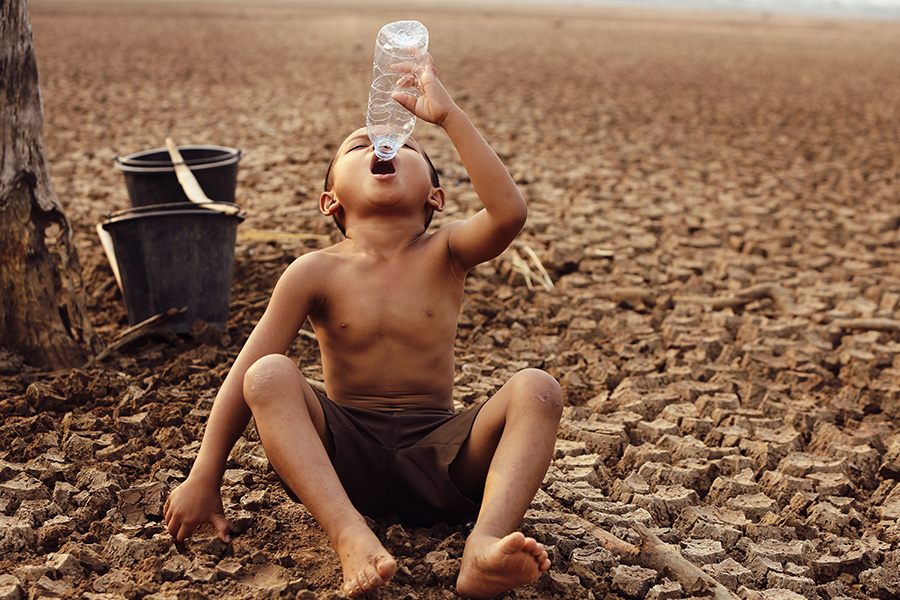WATER SCARCITY CRISIS : HOW ARE WE AND THE WORLD WITHOUT WATER?
 Source: research.jgu.edu.in
Source: research.jgu.edu.in
Water has very important benefits in our lives. Firstly, water is an essential source of life for all living things. We need it to drink and keep our bodies healthy. In addition, water also plays an important role in maintaining hygiene and sanitation. We use water to bathe, wash clothes, and clean our surroundings. In addition, water is also used in agriculture and industry for crop irrigation, machine cooling, and production processes. In addition to its practical benefits, water also provides aesthetic value, such as waterfalls and lakes that provide natural beauty. Thus, water is an invaluable source of life and we need to preserve its existence so that it can be enjoyed by future generations.
Water is a natural resource that is essential for human life and the environment. However, the water shortage crisis is increasingly becoming a global concern as the available water supply is diminishing. The water shortage crisis can have serious impacts on humans and the environment. This article aims to provide an understanding of the water shortage crisis and its impact on humans and the environment. In addition, this article will also discuss some solutions to overcome the water shortage crisis. Water shortage crisis can occur due to various factors such as climate change, population growth, urbanization, and water pollution. The impacts of the water shortage crisis are serious, including health, food, ecosystem, and conflict between communities. Therefore, a concerted effort from the community, government and private sector is needed to address the water shortage crisis. Some of the solutions include improving water use efficiency, developing water treatment technologies, protecting water sources, and increasing public awareness about the importance of sustainable water management.
Various solutions to address the Earth’s water crisis include reducing water usage through measures like shorter showers and rainwater collection for non-potable purposes. Governments should also prioritize the development of sophisticated water filtration systems to ensure widespread access to safe and purified drinking water, devoid of harmful contaminants. While desalination of seawater offers potential as a freshwater source, the energy-intensive nature of the process poses a significant challenge. Moreover, in response to climate change impacts, it is crucial for governments to increase water storage in reservoirs, allowing efficient capture and storage of floodwater to serve as a vital resource during drought periods. The successful implementation of these strategies necessitates a collective and dedicated effort from environmental stakeholders and governmental bodies to effectively combat the pressing global water crisis (Marshall, 2011).
Water shortage crisis is a critical global concern as its supply decreases. Serious impacts are posed on either humans or the environment. This article aims to provide an understanding of the crisis and the consequences. Factors such as changes in climate, increasing population, urbanization, and contamination of water resources contribute to this issue. The impacts are far reaching, affecting human and other living things’ health, food availability, natural ecosystems, and leading to tension among communities. Addressing this crisis requires collective efforts. Solutions include enhancing the efficiency of water use, advancing water treatment technologies, safeguarding water resources, and raising public awareness regarding sustainable water management. It is essential to decrease the water consumption by taking shorter shower times and collecting rainwater. Advanced water filtration should be prioritized as for drinking water and desalination of seawater for freshwater alternatives. Responding to climate change, increasing water storage in reservoirs during times of drought is vital in response to climate change. A sustainable water future for all will be secured as long as environmental groups and governments work together.
REFERENCES
- Emile and Clammer. (2022). Addressing water scarcity in developing country contexts: a socio-cultural approach. Journal of Water Management.https://research.jgu.edu.in/addressing-water-scarcity-in-developing-country-contexts-a-socio-cultural-approach/
- Pangesti, R. (2022). 10 Fungsi Air bagi Kehidupan Manusia, Tak Hanya Minum & Mandi. detik.com. https://www.detik.com/edu/detikpedia/d-5886584/10-fungsi-air-bagi-kehidupan-manusia-tak-hanya-minum–mandi
- Nurfariza, S. (2023). Air Sebagai Sumber Kehidupan. kumparan.com. https://kumparan.com/siva-nur-fariza/air-sebagai-sumber-kehidupan-1zYlkcZgNbp
- Marshall, S. (2011). The Water Crisis in Kenya: Causes, Effects and Solutions. Global Majority E-Journal, 2(1), 31-45.

